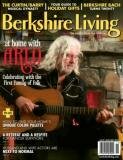
MUSIC REVIEW: Boston Symphony Chamber Players
TANGLEWOOD - OZAWA HALL
BOSTON SYMPHONY CHAMBER PLAYERS
JULY 14, 2010
Reviewed by Clarence Fanto
(LENOX, Mass., July 15, 2010) — Founded in 1964 to showcase the individual skills of the BSO's principal first-desk members, the Boston Symphony Chamber Players also perform commissioned new works and record them for the BSO Classics label. The annual Ozawa Hall appearance on July 14 by the rotating group of orchestra members led by Concertmaster Malcolm Lowe showcased one of the recent commissions, Michael Gandolfi's Plain Song, Fantastic Dances, composed in 2005.
Gandolfi, a 1996 alumnus of the Tanglewood Music Center, has been on the composition faculty there for 12 years and, teaches at the New England Conservatory in Boston and also delves into blues, rock and jazz as an electric guitarist. His three-movement, 20-minute suite — composed in honor of the private arts-and-letters St. Botolph Club's 125th anniversary as a Boston Brahmin institution (it first admitted women in 1988) — is an appealing, accessible set of variations based on plain song (Gregorian chant) followed by an acerbic Tango Blues and a Quick Step finale, filled with angular rhythms before reprising the opening theme.
It's a septet for the unusual combination of violin, viola, cello, double bass, clarinet, horn and bassoon. Reflecting intensive preparation by Messrs. Lowe, violist Steven Ansell, BSO principal cellist Jules Eskin (a 46-year veteran of the orchestra and a 1948 TMC graduate), Edwin Barker on double bass, clarinetist William Hudgkins, bassoonist Richard Svoboda and principal horn James Sommerville, the work shimmered, teased and pleased through its unpredictable quick shifts of mood and tempo.
The stellar cast tossed off the work in jaunty fashion with nary a slip — definitely ready for the recording studio. The intricate rhythms and rapidly shifting contrapuntal transitions were handled with aplomb and the composer appeared on stage to take a bow and thank the players.
Gandolfi's piece was the concert's finale — the most weighty work, the 40-minute Brahms Clarinet Quintet, opened the evening and received a curiously understated, efficient yet far from transcendental performance. This cry from the heart, filled with autumnal splendor as one of the aging composer's final works after he reversed his decision to retire so as "to let the young people take over," is a direct descendant of Mozart's Clarinet Quintet and is among the glories of the chamber-music repertoire. It ends with a musical sigh of resignation — perhaps reflecting Brahms's 40-year, unconsummated passion for Clara Schumann — but as performed on this occasion, the work seemed curiously bloodless, lacking in spirit and inspiration. The players dispatched it accurately but with a dutiful approach that reduced impact and injected an element of routine.
Preceding the Gandolfi piece on the program's second half was an odd pairing of Mozart's familiar Oboe Quartet in F (a charming account highlighted by BSO principal oboist John Ferrillo's expert playing) and the Bachianas Brasilieras No. 6 for flute and bassoon by Hector Villa-Lobos. Elizabeth Rowe, the orchestra's outstanding principal flutist joined Svoboda in this fanciful and fantastical blending of Bach's style and Brazilian folk music. The two movements contrast the popular street music of Rio with the Indian folk melodies of the interior. Performed with impressive technique and careful attention to detail, this delightful bauble went by all too quickly.
Overall, an evening of highlights and medium-lights that, at its best moments, demonstrated the solo-spotlight and group-ensemble capabilities of the BSO's best players.
Clarence Fanto reviews music for Berkshireliving.com and is a contributing editor of Berkshire Living.

 Delicious
Delicious Digg
Digg StumbleUpon
StumbleUpon Propeller
Propeller Reddit
Reddit Magnoliacom
Magnoliacom Newsvine
Newsvine Technorati
Technorati
